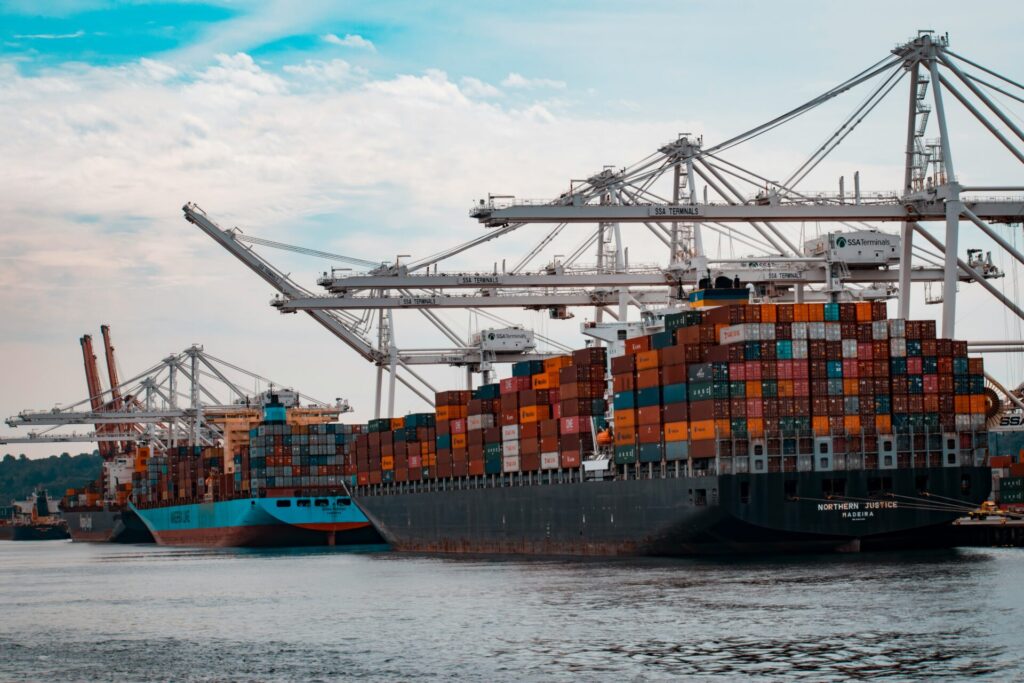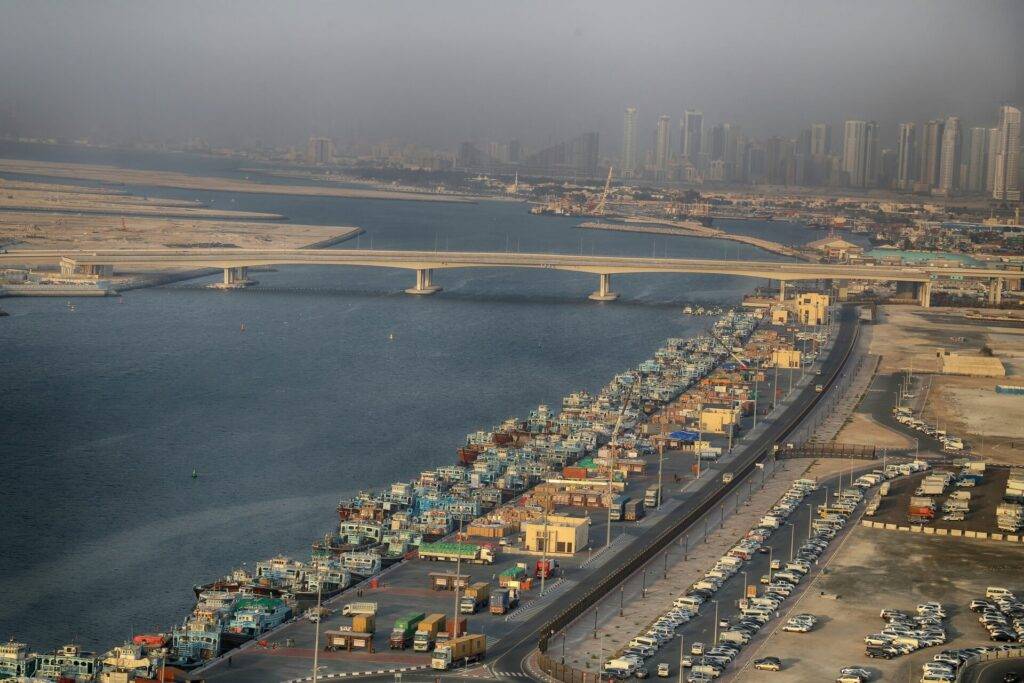Starting an Import Export Business in Dubai
The import-export industry has a long history of facilitating the exchange of goods between countries, meeting global demand and supply. Import includes bringing goods/things into own country from another country, while export means the delivery of goods from own country to another country. This reciprocal trade is fundamental to international commerce.
Table of Contents
ToggleDubai, with its strategic location, advanced infrastructure, and business-friendly policies, stands out as an ideal hub for import-export businesses. Its geographical advantage facilitates efficient logistics and access to global markets, enhancing opportunities for trade.
The UAE has leveraged international trade to bolster its economy, maintaining stable trade relations throughout the world and advocating for open trade policies. This strategic approach has positioned the UAE as a pivotal player in global commerce.
Starting an import export business in Dubai is therefore a popular and reliable choice because of these favorable conditions. Alfa Zone, a leading business setup consultancy, can assist you in obtaining an import export license in the UAE. Our experts provide comprehensive guidance on navigating regulatory requirements, ensuring a smooth setup process tailored to your business needs.
This strategic move not only capitalizes on Dubai’s favorable business environment but also taps into the UAE’s robust trade ecosystem, fostering growth and opportunity in the import-export sector.
Why Dubai for Import Export Business in the UAE?
The import and export sector thrives in the UAE due to several key factors:
- Strategic Location: Situated at the intersection of Asia, Africa, and Europe, the UAE serves as a pivotal global logistics hub. This geographical advantage facilitates seamless transportation of goods, enabling businesses to efficiently connect with international markets.
- Business-Friendly Environment: The UAE government fosters a conducive environment for businesses through incentives like tax exemptions, simplified regulations, and designated free trade zones. These initiatives significantly lower the barriers to entry and operational costs for import-export businesses.
- Open Economy: With minimal trade restrictions, the UAE maintains an open economy that encourages diverse import and export activities. Businesses enjoy the flexibility to trade in a wide range of goods, contributing to economic diversity and growth.
- Government Support: The UAE government actively supports the import-export sector by investing in infrastructure development, negotiating advantageous free trade agreements, and providing comprehensive assistance to businesses. This proactive support enhances trade efficiency and competitiveness.
- Top-notch Infrastructure: The UAE boasts world-class infrastructure, including state-of-the-art airports and seaports equipped to handle large volumes of cargo. These facilities streamline logistics operations, ensuring swift and reliable import and export processes.
- Free Trade Agreements: The UAE has established free trade agreements with numerous countries worldwide. These agreements eliminate or reduce trade barriers such as tariffs and quotas, making import and export activities more cost-effective and attractive for businesses.
These factors collectively position the UAE as a preferred destination for import-export businesses seeking strategic advantages, operational efficiency, and access to global markets. This supportive ecosystem continues to fuel the growth and resilience of the import-export sector in the region.
Top 10 Import Export Opportunities in Dubai- Import Export Business in Dubai
Here are the top 10 investment opportunities in the import and export business in Dubai, highlighting lucrative sectors and business ideas:
- Export Business Agent Acting as an export trade agent involves facilitating the shipment of products to international markets. Success in this role requires knowledge of currency transactions and familiarity with import-export laws and regulations.
- Art Exports Dubai’s allure as a global destination has boosted demand for luxury items like international art. Exporting art to collectors worldwide presents a profitable opportunity, despite import duties and VAT charges imposed by the UAE government.
- Product Sourcing Agent As a product sourcing agent, you connect businesses to global supply chains. This business requires organizational skills and attention to detail, offering low barriers to entry and potential collaborations with local buying agents.
- Electronics Product Provider Importing and exporting electronics components such as power wires, capacitors, and computer accessories is a thriving sector in Dubai. The city’s robust electronics market and strategic location enhance opportunities for large-scale trade.
- Freight Brokerage Company Establishing a freight brokerage company in Dubai involves facilitating logistics between shipping companies and clients. With Dubai’s flourishing export industry, there’s ample scope to provide clearing and forwarding services.
- Precious Metals Marketing Dubai is renowned for its trade in precious metals like gold, silver, and diamonds. Exporting these commodities to global markets remains highly lucrative due to consistent international demand.
- Vehicle Exports Leveraging Dubai’s strong automotive industry, exporting vehicles such as luxury cars presents a promising business opportunity. Collaborations with automakers and access to high-demand luxury brands enhance market potential.
- Auto Parts Exports Focusing on exporting auto parts and accessories is another viable niche within Dubai’s automotive sector. The high demand for quality parts supports a sustainable business model with opportunities for growth.
- Activated Carbon from Coconut Shell Export Despite not being a major producer of coconuts, Dubai exports activated carbon derived from coconut shells. This product is essential for applications like gold extraction and water purification, offering niche export opportunities.
- Aluminum Import-Export Dubai’s aluminum sector presents opportunities in both importing and exporting aluminum products. While lucrative, this business segment requires adherence to strict regulatory requirements and obtaining necessary licenses.
These investment opportunities underscore Dubai’s status as a global trade hub for import export business in Dubai, offering entrepreneurs and investors diverse avenues to capitalize on its strategic location, robust infrastructure, and supportive business environment. Each sector presents unique advantages and challenges, making it essential to conduct thorough research and possibly seek guidance from business setup consultants like Alfa Zone to navigate regulatory complexities and maximize success.
Read Article: 10 Business Opportunities in Dubai UAE

Things to Know Before Starting an Import Export Business in Dubai
Before embarking on an import-export business in Dubai, there are several crucial aspects to understand to ensure compliance and smooth operations:
- Customs Regulations and Registration: All goods imported to and exported from Dubai undergo thorough inspection by the Customs Office to ensure compliance with regulations. To start your business, you must register with Dubai Customs, which can be done online through the Mirsal 2 system. Guides are available on their website to assist with registration and the initial steps of setting up your import-export operations.
- Import-Export License: You cannot commence trading in Dubai without obtaining an Import-Export License. This license must be obtained from the Dubai Chamber of Commerce and Industry. The cost varies based on the type of business activity but typically exceeds AED 25,000 on the mainland, with an initial license fee of AED 2,000 and an annual renewal fee of AED 1,000.
- Free Trade Zones: Goods exported from UAE Free Trade Zones are exempt from customs duties as these zones are not under UAE Customs territory. This exemption makes Free Trade Zones particularly advantageous for international trade operations.
- Requirements for Importers and Exporters: Whether operating from Dubai mainland or Free Trade Zones, importers and exporters must adhere to specific requirements:
- Provide the importer/exporter code when shipping goods.
- Ensure the goods being imported/exported align with those specified in the import/export license.
- Goods must reach their destination within 72 hours of shipping or receipt.
- Import/Export Clearance Procedure: Understanding the clearance procedure is essential for compliance. When importing goods to Dubai, required documents include the certificate of origin, import declaration form, permits for restricted goods, delivery orders, invoices, packing lists, trade licenses, and DFSA declaration.
- Export Documentation: Exporters must prepare detailed documentation, including the export invoice, packing list, bill of entry (BOE), original waybill, original commercial invoice, and certificate of origin approved by the Chamber of Commerce at the country of origin. Exemption forms for customs duties are necessary if exemption requirements are met.
These procedures and regulations ensure that import-export businesses in Dubai operate legally and efficiently. Familiarizing yourself with these requirements and possibly seeking guidance from experts can facilitate a successful venture in this dynamic global trade hub.
Import Export Business in Dubai (Mainland vs Freezone vs Offshore)
When considering where to establish your import-export business in Dubai, choosing between Mainland, Freezone, or Offshore company registration can significantly impact your operations and costs. Here’s a detailed comparison to help you make an informed decision:
1. Mainland
Benefits:
- Allows trading anywhere in the UAE, including both mainland and free zones.
- Offers a broad spectrum of business activities, ideal for import-export operations.
- Recent regulations allow for 100% foreign ownership in many sectors.
Drawbacks:
- In some cases, requires a local service agent, depending on the business activity.
- Higher setup and operational costs compared to free zones.
- More complex regulatory requirements compared to free zones.
2. Freezone
Benefits:
- Allows 100% foreign ownership and full repatriation of profits.
- Streamlined company setup process with minimal bureaucratic hurdles.
- Often enjoys tax exemptions on corporate income and import/export duties, depending on the specific free zone.
- Many free zones cater to specific industries, offering specialized infrastructure and business support.
Drawbacks:
- Restrictions on trading within the UAE mainland; can usually trade internationally.
- Limited in the range of permitted business activities compared to the mainland.
- Annual fees for maintaining the free zone license.
3. Offshore
Benefits:
- Lowest setup and operational costs among the three options.
- Allows 100% foreign ownership and complete repatriation of capital.
- No requirement for physical office space in Dubai.
Drawbacks:
- Cannot conduct business within the UAE; strictly for international transactions.
- Limited applicability for import-export businesses due to restrictions on UAE mainland operations.
Choosing the Right Option:
- Mainland: Suitable if your primary market includes the UAE and you need flexibility to trade both locally and internationally.
- Freezone: Ideal for businesses focused primarily on international trade with minimal need for UAE mainland operations. Offers tax benefits and streamlined setup.
- Offshore: Best for businesses that exclusively conduct international trade with no intention of operating within the UAE mainland. Cost-effective for maintaining a corporate presence.
Understanding these distinctions will help you align your import-export business goals with the most suitable company registration option in Dubai. Consider consulting with business setup experts to navigate specific regulations and make an informed choice based on your operational needs and market strategy.
Import Export Business in Dubai – Set-Up Guide:
Starting an import-export business in Dubai involves several key steps to ensure compliance and operational success. Here’s a guide to help you navigate through the process effectively:
1. Register Your Business
The first crucial step is registering your business in Dubai. It’s highly recommended to engage business setup consultants who are well-versed in Dubai’s corporate landscape. They can provide insights into different corporate structures like Limited Liability Companies (LLCs) and sole proprietorships. Understanding these distinctions is vital for selecting the appropriate legal framework for your business.
This process includes choosing a unique business name that adheres to UAE regulations, defining your business activities to determine the correct trade license, and deciding whether to operate within a Free Zone or on the Mainland. Consultants will assist in preparing essential documents such as the Memorandum of Association and obtaining necessary approvals from relevant authorities.
2. Obtain an Import-Export License
Securing an import-export license from the Dubai Chamber of Commerce and Industry is essential for conducting trade activities. The cost of obtaining this license can amount to up to 25,000 AED.
3. Choose Your Office Space
After obtaining your business license, you’ll need to secure physical office space or consider a Flexi-desk option. Office rentals vary, with starting costs around AED 5,000 per month. Flexi-desks offer a cost-effective alternative for startups and eliminate the need for a dedicated office space.
4. Obtain the Relevant Visa
Acquiring the appropriate visa is crucial for conducting business activities in Dubai. You can choose between a transit visa, an import-export visa (valid for 30 days), or a residence visa (lasting at least 1 year). Each visa allows you to transport goods within their respective validity period. Visa applications require documents such as your passport, Emirates ID, and proof of business license, with processing times typically ranging from 2 to 3 weeks.
5. Navigate Customs and Compliance
Ensure compliance with Dubai’s customs regulations by declaring all imports and exports accurately. It’s essential to understand specific requirements for goods, including categories like food products, beauty items, and pharmaceuticals, which may have additional regulatory standards. All imported goods must be declared to UAE Customs, with taxes and duties assessed accordingly.
Understanding the import and export regulations of your target countries is equally crucial, as these may differ significantly from UAE standards. Awareness of potential tariffs and taxes affecting product pricing is essential. Non-compliance with UAE customs regulations can lead to delays, financial penalties, or even confiscation of goods. To mitigate risks, conduct thorough research and seek guidance from experts in company formation to ensure a smooth and compliant launch of your import-export business in Dubai.
Import Export Business License in Dubai
To start an import-export business in Dubai, securing a trade license and registering your company with the Department of Economic Development (DED) are essential steps.
For an import-export venture, obtaining a Commercial License is mandatory. This typically involves registering your business as a Limited Liability Company (LLC). The LLC structure offers liability protection and is widely preferred by businesses in Dubai due to its legal and operational benefits.
By obtaining a trade license and structuring your import-export company as an LLC, you ensure compliance with Dubai’s regulatory framework and fulfill the legal requirements necessary to operate your business effectively in the region. This approach not only provides a solid legal foundation but also facilitates smoother business operations and credibility within the market.
Documents required for an import-export license in Dubai, UAE
Starting an import-export business in Dubai requires specific documentation tailored to your business activity and chosen setup location. Typically, you will need to provide:
- Completed Application Form: This form varies depending on whether you are setting up in a Free Zone or on the Mainland.
- Passport Copy of the Proposed Owner/s: Copies of the passports of all owners/partners involved in the business.
- 2 Passport Size Photos: Recent passport-sized photos of each owner/partner.
- Customs Import Codes: If applicable to your business, you will need customs import codes relevant to the goods you intend to import.
These documents are essential for initiating the registration process and obtaining the necessary licenses from the Dubai authorities, ensuring compliance with local regulations and facilitating the smooth establishment of your import-export business in Dubai.
Ready to Start an Import Export Business in Dubai?
It’s undeniable that starting an import-export business in Dubai presents an incredible opportunity for entrepreneurs aiming to tap into global markets. With its thriving trade environment, strategic location, and business-friendly regulations, Dubai offers a fertile ground for business growth.
Navigating the complexities of setting up such a venture can be daunting, but it doesn’t have to be overwhelming. At Alfa Zone Business Setup, we specialize in simplifying the entire process for you. With our in-depth understanding of Dubai’s business landscape and extensive experience, we handle every aspect from selecting the right business model and company registration to obtaining necessary licenses, managing paperwork, offering PRO services, securing office space, assisting with visas, and more.
Our goal is to streamline your journey, ensuring a smooth and hassle-free experience. By letting us manage the intricacies, you can concentrate on expanding your import-export business in one of the world’s most dynamic markets.
Take the first step towards your success in Dubai today. Reach out to AlfaZone and embark on your entrepreneurial journey with confidence. We’re here to support you at every stage of building and growing your business in Dubai.
Alfa Zone Businessmen Services in Dubai provides comprehensive services for business setup, feasibility studies, business plans, VAT compliance, accounting, audit services, legal consultation, corporate structuring, trademark registration, PRO services, bank account setup, nominee services, auditing, and legal affairs. With extensive experience in the UAE market, we streamline the setup process to avoid unnecessary delays.
For more information on launching your e-commerce business in Dubai, please contact us at info@rework2025.alfazoneuae.com or visit https://alfazoneuae.com
Business Setup Company in Dubai, Business Setup in Dubai, Business Setup Consultants in Dubai, Business Setup in Dubai Free Zone, Business Setup in Dubai Mainland, Import Export Business in Dubai, Business Setup Services in Dubai, Low Cost Business Setup in Dubai,



